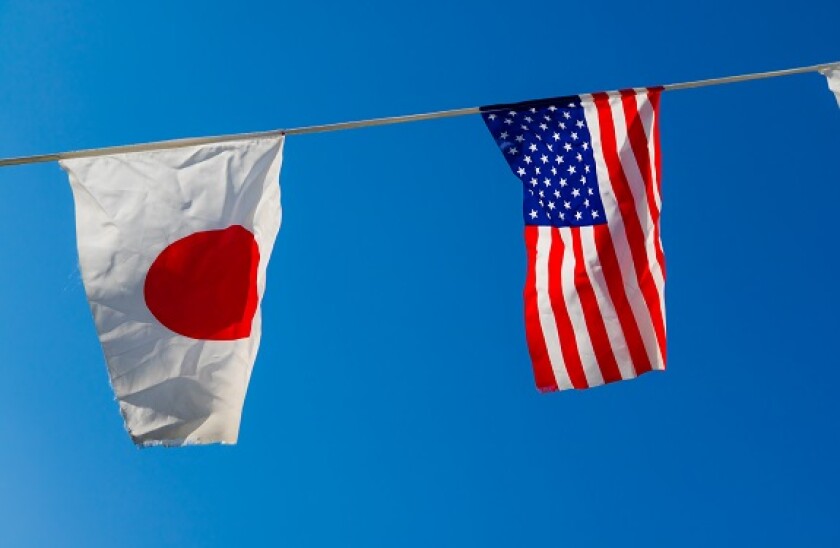Japan’s local banks have been struggling to raise profits, as they operate in a country with low interest rates, a shrinking demand for loans and an aging population.
This year, despite the pandemic, the search for yield and the fight against decades of structural pressure encouraged two local lenders to look at innovative solutions abroad.
According to a large CLO investor and manager, JA Bank Osaka Shinren and Bank of Fukuoka have been part of US deals, actively buying $20m-$30m clips of senior CLO tranches in 2021. In 2019, two banks responding to a survey conducted among 29 regional Japanese institutions confirmed they owned CLO investments. But the bank’s names were not disclosed.
While these institutions are incapable of anchoring a deal by taking full size senior tranches, the preferred approach of Norinchukin and Japan Post Bank, they have proved useful sources of demand and helped to diversify the CLO buyer base.
JA Bank Osaka Shinren is a community-based financial institution for farmers in Osaka. The lender, according to sources, is one of the smallest of Japan’s 105 regional banks. It has an ‘artisanal’ website that is in only in Japanese, as are its financial disclosures.
Bank of Fukuoka is a relatively large bank. It is a subsidiary of Fukuoka Financial Group, a regional financial group covering Kyushu. According to its 2020 annual report, it was rated AA- by Rating and Investment Information (R&I), A+ by the Japan Credit Rating Agency (JCR) and A3 by Moody’s.
Sources say that JA Bank Osaka Shinren is new in the CLO market and it has bought small sized clips, while Bank of Fukuoka has returned to the US market post-pandemic after being in and out since 2019.
“Both entities may be interested in investing in some assets to achieve high yield compared to yen-denominated quoted assets,” said Ryoji Yoshizawa, senior director at S&P Global Ratings in Japan.
S&P in Japan rates 11 regional banks out of 105, and the overall creditworthiness of local banks as stable or negative.
“They generally are in good shape,” added Yoshizawa. “If some regional banks have a negative outlook it is because their profitability is under pressure, especially due to the low interest rate environment of the Japanese yen, and because of the quality of their assets.”
CLOs can be complex vehicles to invest in. They require the resources and expertise to conduct deep analyses, looking through to the underlying obligors and understanding cashflows and creditor protections. This is a process that could challenge major and local Japanese banks, said Yoshizawa.
“They have to get the funding in dollars not in yen to accommodate the investment,” Yoshizawa explained. “From that perspective, the size of the bank might be important to invest in US CLOs, as the recognition from dollar suppliers would become crucial.
“The other aspect is that investing in US CLOs requires resources and knowledge of the vehicle, to analyse and address the risk. For banks that don’t have those resources and expertise, it would cause problems to invest in CLOs,” Yoshizawa said.
The challenges, according to CLO sources, did not prevent local lenders from turning to the market, which has been in recovery since the pandemic, with a particularly rapid spread tightening over the last quarter. In 2021, triple-A spreads have tightened around 25bp, and primary volumes have boomed, with Bank of America counting $43bn in supply in February alone.
Other Japanese institutions are active in the market through US subsidiaries. Symetra Financial Corporation, a US subsidiary of Japan-based Sumitomo Life Insurance, boosted its CLO book by $1bn during 2020.
The Washington state-based company expanded its portfolio from $2.7bn in 2019 to $3.68bn by the end of 2020, according to its annual report.
The company may have increased its pace of buying more recently, taking sizeable positions in triple-A tranches from late last year, according to a source.
The portfolio has also seen minimal price moves, suggesting a senior position in the capital structure.
In the analysis of the results, Symetra explained that in an “attempt to mitigate the impact of the low interest rate environment on our investment portfolio, we have pursued strategies that generally provide more attractive yields while retaining an appropriate risk profile”.
Among those strategies, the firm specified that there was also a strategy “to purchase high-quality CLO and investment grade corporate securities as opportunities for favorable yields and diversification arise”.

